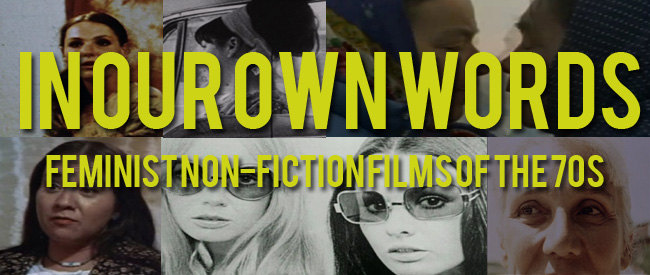
In the years after the birth of second-wave feminism in the 1960s, female directors began incorporating the spirit of the movement into their films. In particular, female directors began turning their cameras on themselves, and other women, in order to tell their own stories without interference.
With IN OUR OWN WORDS: FEMINIST NON-FICTION FILMS OF THE 70S, Spectacle presents a collection of (mostly) female-directed films, each with the aim of shedding light on underrepresented stories of women’s lives. From girls growing up, and women incarcerated, in the United States, to Native matriarchal societies in Canada, to a repressive boarding school in England, these films tell women’s stories, with minimal narration or outside voices.
Even though these films were made 40 years ago, they beg the question: how much has actually changed, and what has stayed the same?
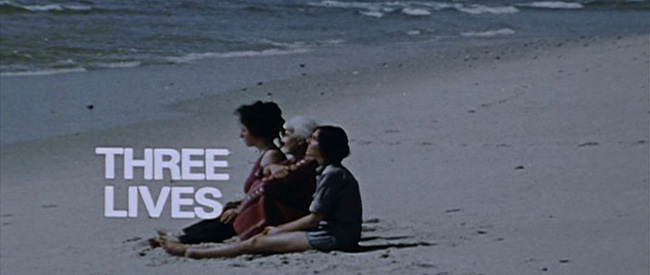
THREE LIVES
Dir. Kate Millett, 1971
USA, 70 min
FRIDAY, SEPTEMBER 12 – 10:00 PM
TUESDAY, SEPTEMBER 23 – 7:30 PM
SATURDAY, SEPTEMBER 27 – 10:00 PM
TUESDAY, SEPTEMBER 30 – 7:30 PM
“Kate Millett’s Three Lives is a moving, proud, calm, aggressively self-contained documentary feature…” – Vincent Canby, The New York Times
Feminist author Kate Millett was a second-wave powerhouse; in 1970, she published Sexual Politics, called by Norma Wilson “one of the first feminist books of this decade to raise nationwide male ire,” and which, obviously, made her an enemy of Norman Mailer. In 1971, Millett brought together an all-female crew, under the name Women’s Liberation Cinema, to film three women’s remembrances of their lives.
THREE LIVES portrays three women: Robin Mide, an artist; Lillian Shreve, a chemist; and Mallory Millet-Jones, Millett’s own sister. The camera is a quiet observer, letting the women, from three different paths and generations, tell their own stories without outside interference. Through these women’s personal revelations, a narrative of living under the patriarchy is revealed. The personal is political, indeed.
Courtesy of Kate Millett.
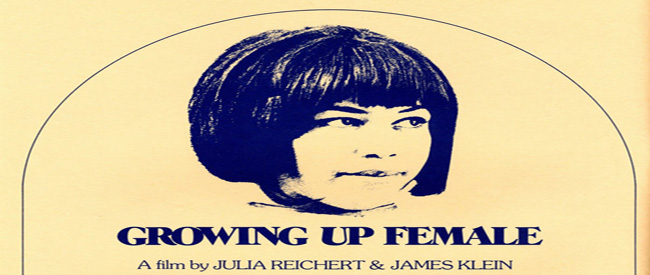
GROWING UP FEMALE
Dir. Jim Klein & Julia Reichert, 1971
USA, 50 min.
Screens with MOTHER OF MANY CHILDREN
TUESDAY, SEPTEMBER 9 – 7:30PM
FRIDAY, SEPTEMBER 12 – 7:30 PM
MONDAY, SEPTEMBER 15 – 10:00 PM
TUESDAY, SEPTEMBER 23 – 10:00 PM
“One of those painful experiences that’s good for you…I wish every high school kid in America could see this film.” – Susan Sontag
GROWING UP FEMALE proclaims itself as “the first film of the women’s movement,” and while that claim might be questionable, there is no double that the film proclaimed a new frontier in non-fiction filmmaking. GROWING UP FEMALE is the first major documentary about what it means to be a woman in America, and particularly, what it means to be a young girl, and how girls are de facto trained by society to live under the patriarchy.
Directed by documentary filmmakers (and partners) Jim Klein and Julia Reichert, GROWING UP FEMALE consists of a series of vignettes, in which women tell their own stories about, well, growing up female: schooling, social conditioning, and the eventual awakening to the dissatisfaction and frustration that accompanies being female in America. It’s often painful and heart-wrenching, but a powerful document of what female socialization actually looks like. Chosen by the Library of Congress for the National Film Registry, the film was used by consciousness-raising groups in the 70s to convince dubious audiences of the need for the feminist movement.
Courtesy of New Day Films and Jim Klein.
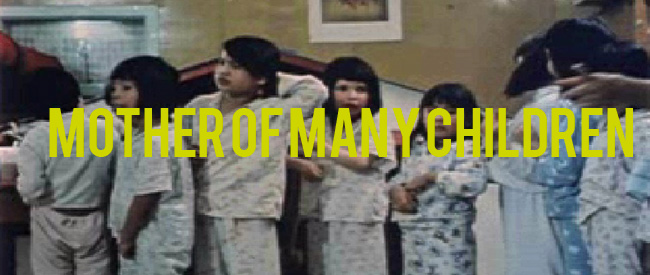
MOTHER OF MANY CHILDREN
Dir. Alanis Obomsawin, 1977
Canada, 58 min.
Screens with GROWING UP FEMALE
TUESDAY, SEPTEMBER 9 – 7:30 PM
FRIDAY, SEPTEMBER 12 – 7:30 PM
MONDAY, SEPTEMBER 15 – 10:00 PM
TUESDAY, SEPTEMBER 23 – 10:00 PM
As a counterpart to the American girls from GROWING UP FEMALE, Abenaki director-singer songwriter-artist Alanis Obomsawin trained her cameras on Canadian Native women and girls in MOTHER OF MANY CHILDREN. Obomsawin films women from different First Nations to portray the life cycle of a series of Native women in Canada, where the women’s traditionally matriarchal societies feel the pressure to conform to Canadian values.
Through interviews with women of many First Nations, we see the struggle between these women’s traditional values and those of white society, adding another layer of conflict between these women and the culture around them. The women interviewed in the film include an 108-year old Cree elder, and the film is a loving, subtly (yet radically!) political portrait of First Nations women.
Courtesy of Women Make Movies.

INSIDE WOMEN INSIDE
Dir. Christine Choy & Cynthia Maurizio, 1978
USA, 28 min.
Screens with PRIDE OF PLACE
TUESDAY, SEPTEMBER 9 – 10:00 PM
MONDAY, SEPTEMBER 15 – 7:30 PM
MONDAY, SEPTEMBER 29 – 7:30 PM
While the girls of PRIDE OF PLACE may often have felt, understandably, as if they were in prison, filmmakers Christine Choy and Cynthia Maurizio took their cameras to the North Carolina Correctional Center for Women and the Correctional Institute for Women’s at Riker’s Island to document the daily lives of female prisoners in INSIDE WOMEN INSIDE. The result is a gut-wrenching piece of cinema verite that reveals the barbaric conditions for women in these prisons.
From forced manual labor and unhealthy food to the substandard care for ill or pregnant women, INSIDE WOMEN INSIDE details the daily punishments and humiliations doled out at women in these institutions.
Courtesy of Third World Newsreel.
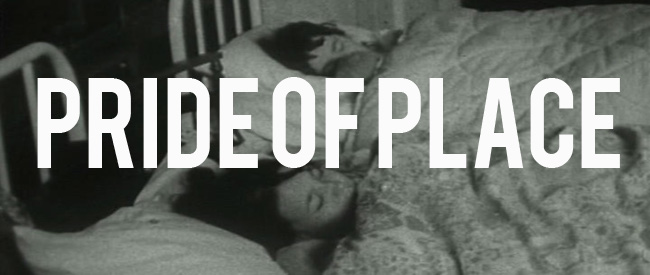
PRIDE OF PLACE
Dir. Kim Longinotto & Dorthea Gazidis, 1976
UK, 60 min.
Screens with INSIDE WOMEN INSIDE
TUESDAY, SEPTEMBER 9 – 10:00 PM
MONDAY, SEPTEMBER 15 – 7:30 PM
MONDAY, SEPTEMBER 29 – 7:30 PM
With PRIDE OF PLACE, director Kim Longinotto (the subject of a Spectacle series in March of this year) made her intensely personal directorial debut, co-directed with Dorthea Gazidis. Made while Longinotto was a film student, PRIDE OF PLACE is a non-fiction revenge film against a boarding school she was forced to attend as a teenager. Longinotto has said about her time at the school: “You were never told that anything you did was good; in fact, you were always told what was bad. The result was that I came out of that place with very low self esteem.” Longinotto returns to the school as a filmmaker, wielding her camera as a weapon against this place that systematically put girls down.
The film exposes the girls’ boarding school as a dark, dour place with inexplicable rules, repressive punishments, and even inedible food. Through interview with the students, Longinotto gets an inside perspective of the school as a place that crushes girls’ spirits. Thankfully, a year after PRIDE OF PLACE was released, the school was shut down, but the film still stands tall as a portrait of institutional rage against young girls.
Courtesy of Women Make Movies.
